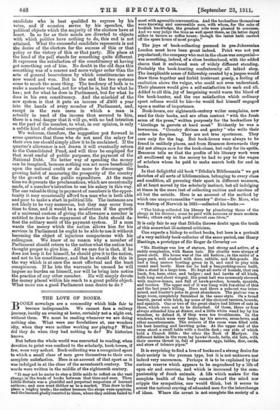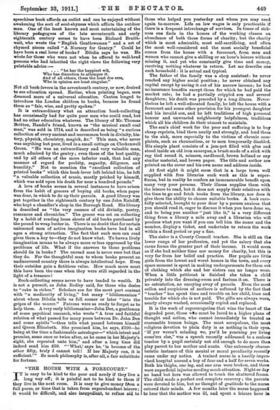THE LOVE OF BOOKS.
BOOKS nowadays are a commodity which bids fair to become indispensable. We cannot face a railway journey, hardly an evening at home, certainly not a night outs without them. We must be reading whenever we are doing nothing else. What were our forefathers at, one wonders
idly, when they were neither working nor playing? What did they do when they had nothing to do? No historian knows.
But before the whole world was converted to reading, when devotion to print was confined to the scholarly, book-lovers, if few, were very ardent. Book-collecting was a recognized sport
to which a small class of men gave themselves to their own complete satisfaction. Here is an account of that sport as it was indulged in at the close of the seventeenth century. The words were written in the middle of the eighteenth century.
" It may not be amiss to step a little aside to reflect on the vast change in the trade of books between that time and ours. Then Little-Britain was a plentiful and perpetual emporium of learned authors ; and men went thither as to a market. This drew to the place a mighty trade ; the rather because the shops were spacious, and the learned gladly resorted to them, where they seldom failed to meet with agreeable conversation. And the booksellers themselves were knowing and conversible men, with whom, for the sake of bookish knowledge, the greatest wits were pleased to converse. And we may judge the time as well spent there, as (in latter days) either in tavern or coffee house: though the latter hath carried off the spare hours of most people."
The joys of book-collecting pursued in pre-Johnsonian London must have been great indeed. Print was not yet
popularized; the company who met in the chase was congenial— was something, indeed, of a close brotherhood, with the added charm that it embraced men of widely different standing.
Probably the book-hunting confraternity all talked shop.
The inexplicable sense of fellowship created by a jargon would draw them together and forbid irrelevant gossip, a feeling of exaltation above the vulgar, who could not even understand. Their pleasure would give a sell-satisfaction to each and all.
Added to all this, joy of bargaining would warm the blood of the book-hunter, and the one satisfaction which ordinary sport refuses would be his—he would feel himself engaged upon a matter of importance.
Book-lovers, our eighteenth-century writer complains, now send for their books, and are often content " with the fresh scum of the press," written purposely for the booksellers by "hirelings in garrets at hard meat." Evidently he was a townsman. " Country divines and gentry " who write their orders he despises. They are not true sportsmen. They care only for the bag. But book-lovers were always to be found in unlikely places, and from Erasmus downwards they did not always care for the book-chase, but only for its spoils. Erasmus tells us that the profits of his literary work were all swallowed up in the money he had to pay to the wages of scholars whom he paid to make search both for and in books.
In that delightful old book " Dibdin's Bibliomania " we get sketches of all sorts of bibliomaniacs, belonging to every class and condition, all pursuing their sport in different manners, all at heart moved by the scholarly instinct, but all indulging at times in the mere lust of collecting rarities and careless of all but the outside. Here is an account of the method by which one unsportsmanlike "country" divine—Dr. More, who was Bishop of Norwich in 1691—collected his books :—
" The bishop collected his library by plundering those of the clergy in his diocese ; some he paid with sermons or more modern books ; others only with quid iUiterati cum libris."
It is only fair to say that Dibdin throws doubt upon the truth of this somewhat ill-natured criticism.
One expects a bishop to collect books, but here is a portrait of a very unlikely book-collector of the same period, one Henry Hastings, a prototype of Sir Roger de Coverley
"Mr. Hastings was low of stature, but strong and active, of a ruddy complexion, with flaxen hair. His cloaths were always of green cloth. His house was of the old fashion; the midst of a large park, well stocked with deer, rabbits, and fish-ponds. He had a long narrow bowling green in it, and used to play with round sand bowls. Here too he had a banquetting-room built, like a stand in a large tree. He kept all sorts of hounds, that ran buck, fox, hare, otter, and badger ; and had hawks of all kinds, both long and short winged. His great hall was commonly strewed with marrow-bones, and full of hawk-perches, hounds, spaniels, and terriers. The upper end of it was hung with fox-skins of this and the last year's killing. Here and there a pole-cat was inter- mixed, and hunter's poles in great abundance. The parlour was a large room, completely furnished in the same style. On a broad hearth, paved with brick, lay some of the choicest terriers, hounds, and spaniels. One or two of the great chairs had litters of cats in them, which were not to be disturbed. Of these, three or four always attended him at dinner, and a little white wand lay by his trencher, to defend it, if they were too tronblesonie. In the windows, which were very large, lay his arrows, cross-bows, and other accoutrements. The corners of the room were filled with his best hunting and hawking poles. At the upper end of the room stood a small table with a double desk ; one side of which held a Church Bible : the other the Book of Martyrs. On different tables in the room lay hawks'-hoods, bells, old hats, with their crowns thrust in, full of pheasant eggs, tables, dice, cards, and store of tobacco pipes."
It is surprising to find a love of books and a strong desire for their society in the yeoman type, but it is not unknown nor indeed very uncommon. Perhaps it is to be explained by the curious reserve which appears to be engendered by a life of open air and exercise, and which is increased by the com- panionship of dumb animals. A life which makes for the
complete health of the body cannot dwarf the mind nor cripple the sympathies, one would think, but it seems to arrest the natural craving of educated men for the interchange of ideas. Where the arrest is not complete the society of a speechless book affords an outlet and can be enjoyed without awakening the sort of soul-shyness which afflicts the outdoor man. One of the least known and most entertaining of the literary pedagogues of the late seventeenth and early eighteenth century seems to have been Richard Braith- wait, who wrote the "English Gentlewoman" and a set of rhymed pieces called "A Nursery for Gentry." Could he have been a real lover of books P Dibdin says he was. He wrote for those who were not when he offered to well-bred persons who had inherited the right views the following very palatable advice :—
. . . "he has the happiest wit,
Who has discretion to attemper it.
And of all others, those the least doe erre,
Who in opinion are least singular."
Not all book-lovers in the seventeenth century, or now, desired to see education spread. Earlier, when printing began, men dreamed more of a universal education. Caxton longed to introduce the London children to books, because be found them so "fair, wise, and pretty spoken."
It is extraordinary what an attraction book-collecting has occasionally had for quite poor men who could read, but had no other education whatever. The library of Mr. Thomas Britton, Handel's friend, known as "the musical small coal man," was sold in 1714, and is described as being "a curious collection of every ancient and uncommon book in divinity, his- tory, physick, chemistry, magick, lee." This man, who never was anything but poor, lived in a small cottage on Clerkenwell Green. "He was an extraordinary and very valuable man, much admired by the gentry ; even those of the best quality, and by all others of the more inferior rank, that had any manner of regard for probity, sagacity, diligence, and humility." Not to mention the "excellent collection of printed books " which this book-lover left behind him, he left "a valuable collection of music, mostly pricked by himself, which was sold upon his death for near a hundred pounds."
A love of books seems in several instances to have arisen from the habit of grocers of buying old books, when paper was dear, in which to do up their parcels. A good library was put together in the eighteenth century by one John Ratcliff, who kept a chandler's shop in the Borough Road. His library is described as " the very essence of old divinity, poetry, romances and chronicles." The grocer was set on collecting by a habit of reading loose sheets of old books purchased by the pound to wrap butter in. There is no doubt that for certain unlearned men of active imagination books have had in all ages a strong attraction. The fact that such men can read gives them a key to—they do not know what. To have a lively imagination means to be always more or less oppressed by the problems of life. What if the answers to those problems should lie in books P The unread man is never sure but that they do. For the thoughtful man to whom books present an undiscovered country there is always intellectual hope. Even their outsides gain a fictitious value. How much more must this have been the case when they were still regarded in the light of a treasure !
Book-collecting seems never to have tended to wealth. It is not a pursuit, as John Bodley said, for those who desire to " rake in riches." Scholars are for the most part content with " a mediocrity of living," but many " bibliomania.cs " about whom Dibdin tells us fell sooner or later " into the gripes of the usurer." Patrons were as ready to forget as to help them. A very early bibliomaniac—John Dee, a gentleman of some psychical research, who wrote "A true and faithful relation of what passed for many yeers between Dr. John Dee and some spirits "—thus tells what passed between himself and Queen Elizabeth. She promised him, he says, £100—he being at the time a fashionable astrologer—" which intent and promise, some once or twice after, as he came in her Majesty's sight, she repeated unto him," and after a long time did indeed send him £50. " What,' says he, is become of the other fifty, truly I cannot tell ! If her Majesty can, it is sufficient." So much philosophy is, after all, a fair substitute for fortune.







































 Previous page
Previous page